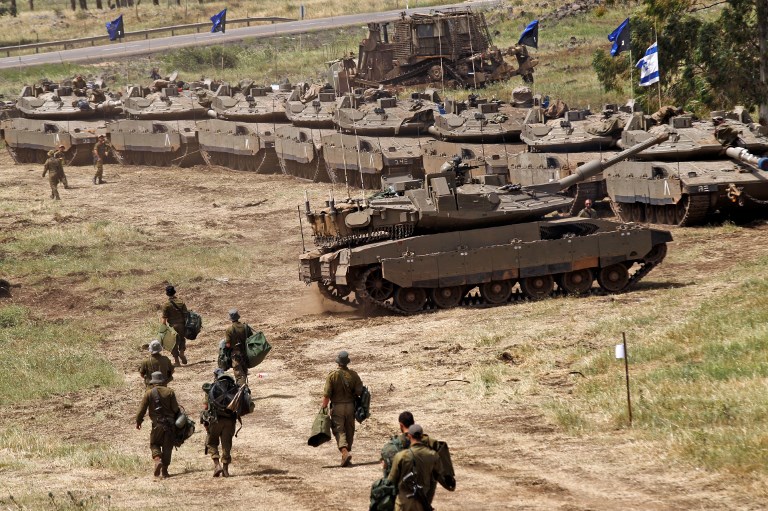
TEL AVIV, Israel (AFP) — The state of Israel has become a major power in the Middle East since it declared its birth as a nation 70 years ago.
It has fought multiple wars and occupied the West Bank and east Jerusalem, while the Israel-Palestinian peace process has been dead since 2014.
Here are some facts about the country.
Military powerhouse
Israel is considered the leading military power in the Middle East and believed to be the only country in the region to possess nuclear weapons.
In 2016 it concluded a $38 billion deal for US military aid for 2019-2028, up from $30 billion in the previous 10-year period.
Neighborly tensions
Israel has sought to avoid direct involvement in the Syrian civil war that began in 2011.
It does however acknowledge carrying out dozens of air strikes there to stop what it says are advanced arms deliveries to its enemy Hezbollah, the Lebanese Shiite group that is backing President Bashar al-Assad’s regime.
Israel, which has pledged to stop Iran from entrenching militarily in Syria, has also been accused of recent raids in Syrian territory that have killed Iranians.
Prime Minister Benjamin Netanyahu claimed in April that he had “proof” via captured documents that Iran had developed a nuclear weapons plan which could be activated at any time.
His statement came as President Donald Trump was to decide on whether to withdraw the United States from the Iran nuclear deal — which he eventually did on Tuesday.
‘Start-up nation’
Israel’s high-tech sector — an industry that has given it the nickname the “start-up nation” — is seen as a global leader, particularly regarding cyber defense and surveillance.
Dozens of foreign companies have opened research and development centres in Israel over the past years.
Natural gas discovery
Israel has limited natural resources but recently discovered major gas fields off its coast and is building infrastructure to tap the gas.
The Tamar gas field, which began production in 2013, has estimated reserves of up to 238 billion cubic metres (8.4 trillion cubic feet).
Leviathan, discovered in 2010 and set to begin production in 2019, is estimated to hold 535 billion cubic metres of natural gas, along with 34.1 million barrels of condensate.
Israel’s economic growth was at 4.1 percent in the last quarter of 2017 but the country is one of the most unequal economies in the developed world.
Land of conflict
Israel’s “war of independence” broke out on May 15, 1948, a day after Zionist leader David Ben-Gurion proclaimed the country’s creation.
Officially Israel has been through eight wars, including the Six-Day War of June 1967.
In that conflict it took more territory, occupying the West Bank, east Jerusalem — which it went on to annex — and the Gaza Strip, from which it unilaterally withdrew in 2005.
It also took parts of the Golan Heights from Syria and Sinai from Egypt, which it later returned in 1982.
The last war was in 2014 in the Gaza Strip.
Two peace treaties have been signed with Arab nations: in 1979 with Egypt, and in 1994 with Jordan.
Settlements, intifadas
Israel’s population has increased tenfold since 1948, reaching 8.8 million according to official statistics in 2018.
Since 1967 Israel has faced problems linked to its military occupation of the Palestinian territories on which it continues to build Jewish settlements.
The United Nations considers Israeli settlement building one of the largest obstacles to peace between Israel and the Palestinians.
There have been two Palestinian uprisings, known as intifadas — in 1987 and 2000.
The first ended with the signing in Washington of the Oslo Accords between Israel and the Palestine Liberation Organisation.
It marked the start of a process aimed at granting Palestinians the right to self-determination. The agreement never achieved a final settlement.
In 2002, during the second intifada, Israel began building a security barrier that snakes across swathes of Palestinian territory and was intended to keep out Palestinian attackers.
© Agence France-Presse








